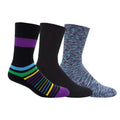Is Orange Juice Good For Diabetics?
Posted by SIMON LIM

Is orange juice good for diabetics? This is a common and valid question because people with diabetes must closely monitor their blood sugar levels which is easily influenced by their food.
Fruits, particularly oranges, receive a common misconception that they are harmful to diabetics and should be avoided.
But, this is not entirely true. Oranges can be part of a diabetic diet plan. However, you may have to limit your intake of oranges to keep your blood sugar levels in check.
So can diabetics drink orange juice?
Benefits of Consuming Oranges for Diabetics
With its fiber, vitamins, minerals, and antioxidants, oranges have everything you need for a healthy diet in one. People with diabetes can safely eat this citrus fruit in moderation.
Fiber provides many health benefits, including illness prevention and control. Fiber-rich diets, in particular, may help control blood sugar levels.
In a meta-analysis of 15 clinical investigations in persons with type 2 diabetes, fiber was found to lower fasting blood sugar levels and hemoglobin A1C (the amount of blood sugar attached to hemoglobin).
A medium-sized orange contains around 4 grams of fiber. Fiber decelerates digestion and reduces the time food in the intestines, hence, slowing the rise in blood sugar after a meal.
People with diabetes may benefit from the numerous vitamins and minerals found in oranges.
The Vitamin C content of a medium orange is around 91% of the daily value. Vitamin C can also help reverse oxidative stress in people with diabetes. Increased blood sugar levels causes oxidative stress, which may lead to cellular damage and disease.
Folate is also found in medium-sized oranges, which provide 12% of the daily value. This mineral may help lower insulin levels and alleviate diabetes-induced eye disease symptoms.
Last but not least, oranges provide 6% of the daily value of potassium. It is necessary for people with diabetes to have normal potassium level because low potassium in the blood can cause insulin resistance. Insulin resistance is when your body doesn't respond to the hormone regulating blood sugar.
Oranges are an excellent source of flavonoid antioxidants. Diabetics can benefit from flavonoid antioxidants, including reduced inflammation, oxidative stress, and reduced insulin resistance.
Are there any drawbacks to consuming oranges for diabetics?

People with diabetes are encouraged by the American Diabetes Association (ADA) to eat citrus fruits like oranges. So if you have diabetes, you can safely eat a whole orange or drink a regulated amount of fresh orange juice.
Though, it is very important to control the intake of orange juice. Orange juice has a variety of nutrients, but it lacks fiber, a nutrient critical to maintaining a healthy blood sugar level.
In addition, the high GI of orange juice and the fact that it is frequently consumed with other carb-rich foods raises the possibility of an elevated blood sugar level as a side effect.
Therefore, for diabetics, the general rule is to drink fresh orange juice in moderation and always watch what they eat with it because of the risk of triggering the symptoms.
Is it better to stay away from oranges?
If you have diabetes, you should make an effort to include oranges in your diet as a variety of whole fruits. Fruit is an essential part of a well-rounded diet.
Choosing whole oranges over 100% fruit juice is the best way to ensure that your blood sugar levels remain stable.
How many do you recommend eating?
Because of an individual’s body size and activity level disparities, there is no one-size-fits-all rule for how many oranges you should eat.
You can eat as many oranges as you like each day, as long as you keep in mind that each serving of carbs equals 15 grams.
Drinking pure orange juice is acceptable, but people with diabetes should limit their intake of these beverages because fruit juice provides only the sugar from the fruit, not the fiber.
Consult a registered dietitian (RD) or certified diabetes educator for a meal plan tailored to your specific needs.
Key Takeaways

If you have diabetes, consuming various fruits, especially oranges, is beneficial. But take note that eating a whole orange is preferred instead of drinking orange juice.
Because of their low glycemic index (GI), fiber content, and other minerals, whole oranges may help keep your blood sugar levels stable. While orange juice has a GI of between 66 and 76 on a scale of 100, making it a high GI snack, it should be consumed with precautions.
Something that will always be beneficial is wearing diabetic socks. Say goodbye to uncomfortable socks and hello to a more enjoyable diabetic lifestyle with our diabetic socks for men and diabetic socks for women.
SHARE:





































